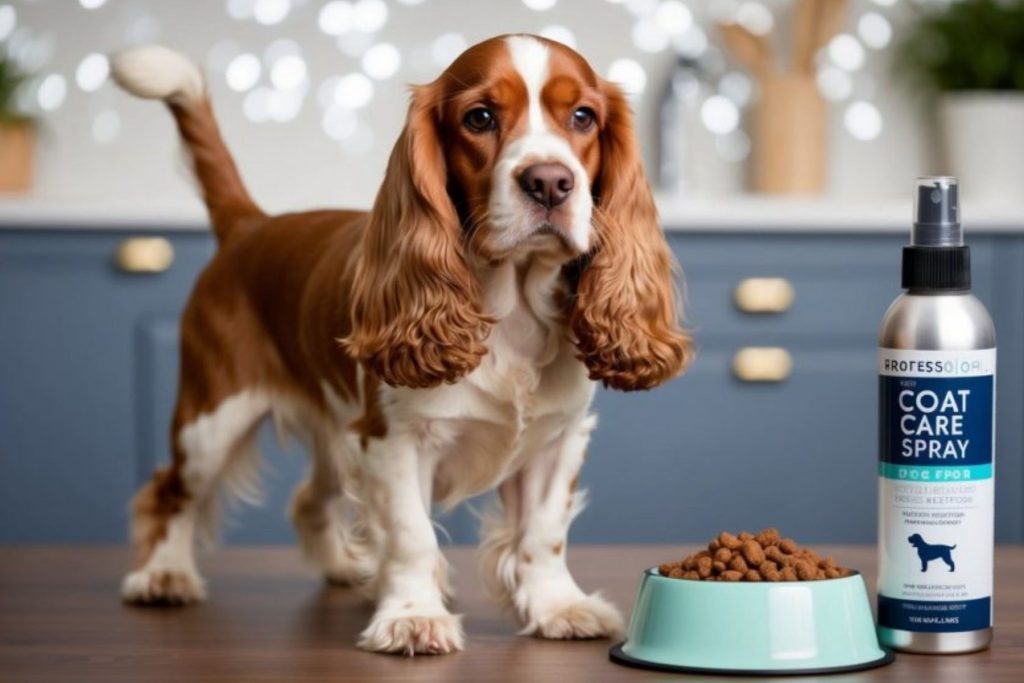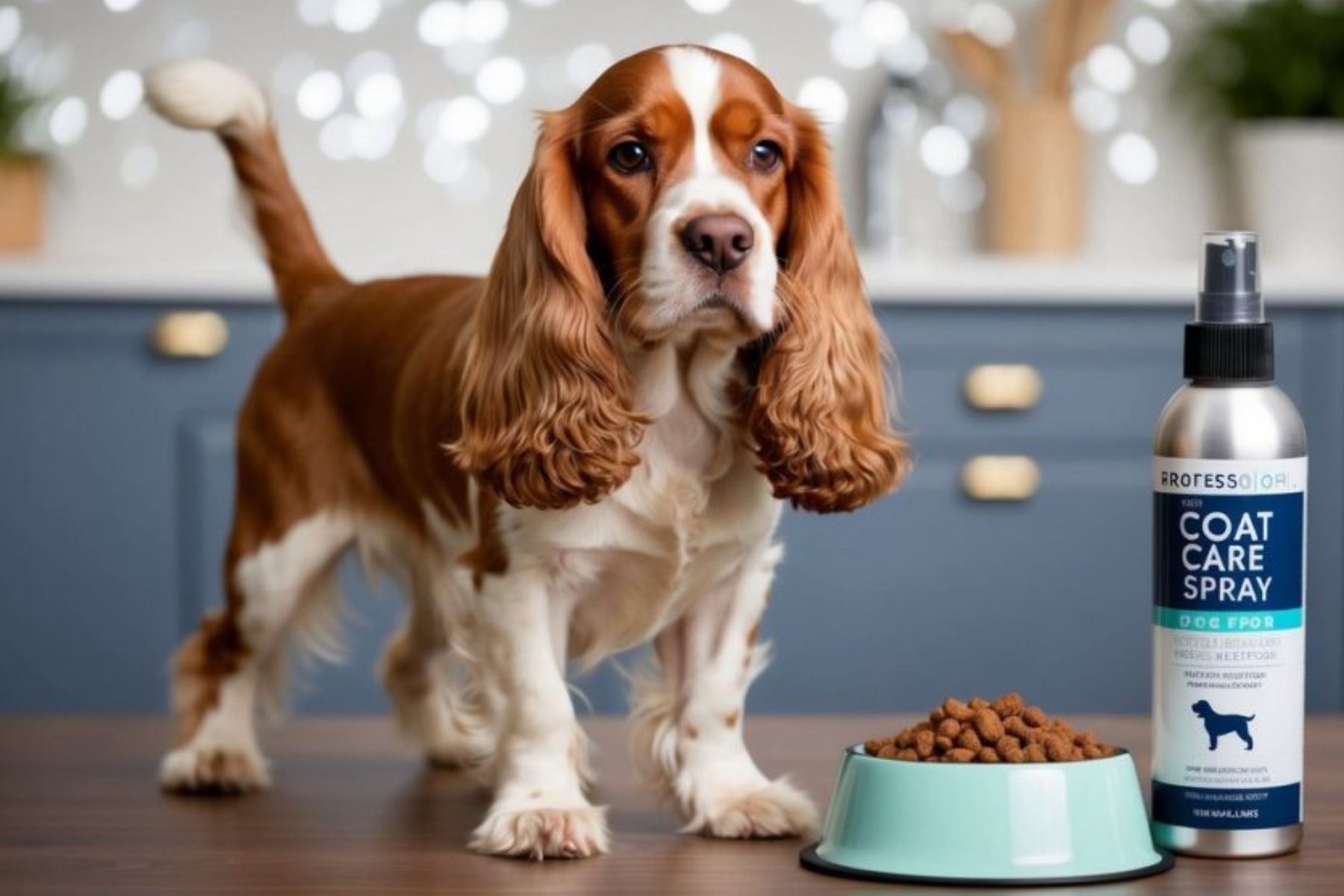When it comes to caring for a Cocker Spaniel, maintaining a healthy and shiny coat is an essential aspect of their overall wellbeing. Known for their long, luscious fur, these dogs require special attention to ensure their coats remain soft, glossy, and free from tangles. Proper nutrition, regular grooming, and the right supplements are crucial in achieving this goal. In this guide, we explore the best supplements for a healthy Cocker Spaniel coat and how they can support your dog’s skin and fur.

Why Coat Health is Important for Cocker Spaniels
Cocker Spaniels are prone to skin conditions such as dryness, allergies, and dandruff, all of which can affect the health of their coats. Their ears, particularly, are prone to infections due to their floppy nature, which can lead to hair thinning in the affected areas. A healthy coat not only improves your dog’s appearance but also enhances its comfort and overall health. A shiny, well-maintained coat is often a reflection of your dog’s internal health, so choosing the right supplements is key.
Key Nutrients for Healthy Cocker Spaniel Coats
Before diving into specific supplements, it’s important to understand the key nutrients that contribute to a healthy coat for your Cocker Spaniel:
- Omega-3 Fatty Acids: These essential fats are vital for maintaining a shiny, moisturized coat and reducing inflammation that can lead to hair loss or skin irritation.
- Omega-6 Fatty Acids: Similar to omega-3s, omega-6 fatty acids support skin health and fur growth, helping to maintain a soft and glossy coat.
- Biotin: Known for its benefits in promoting hair growth and strength, biotin also supports healthy skin and coat condition.
- Zinc: This essential mineral helps regulate oil production in the skin, promoting healthy fur and preventing excessive shedding.
- Vitamin E: A potent antioxidant, vitamin E aids in skin repair, preventing dryness and flakiness while encouraging healthy hair growth.
Top Supplements for a Healthy Cocker Spaniel Coat
Incorporating supplements into your Cocker Spaniel’s diet can help address specific coat concerns like dryness, shedding, or dullness. Here are some of the best options:
1. Omega-3 and Omega-6 Fatty Acids
Fish oil is one of the best sources of omega-3 fatty acids, providing essential nutrients that promote a shiny, healthy coat. Omega-3 fatty acids reduce inflammation and help combat conditions such as dry, flaky skin, and dull fur. Additionally, omega-6 fatty acids, often found in plant-based oils like sunflower or safflower oil, also contribute to a glossy coat and healthy skin.
Best Fish Oil Supplements for Cocker Spaniels:
- Grizzly Salmon Oil: A high-quality supplement that provides essential omega-3 fatty acids to support skin health and a shiny coat.
- Vetoquinol Flexadin Advanced: Contains both omega-3 and omega-6 fatty acids, along with joint health support, making it ideal for active Cocker Spaniels.
- Norwegian Salmon Oil by PetHonesty: This supplement is rich in omega-3 fatty acids, supporting healthy skin and coat while also reducing inflammation.
2. Biotin Supplements
Biotin is a B-vitamin that promotes healthy fur growth and helps maintain a thick, shiny coat. It is especially beneficial for dogs that suffer from hair thinning or dry skin. Biotin can also help treat dry, brittle fur and prevent excessive shedding.
Top Biotin Supplements for Cocker Spaniels:
- Vet’s Best Biotin for Dogs: This supplement is specifically formulated to promote healthy coat growth and maintain a strong, shiny coat.
- NaturVet Biotin Plus: A biotin-based supplement that also supports healthy skin, this option is great for Cocker Spaniels with sensitive skin or fur-related issues.
3. Zinc Supplements
Zinc plays a crucial role in regulating the skin’s oil production and promoting fur growth. A zinc deficiency can lead to hair loss, dry skin, and poor coat quality. For Cocker Spaniels, ensuring adequate zinc intake can help improve the condition of their coat.
Recommended Zinc Supplements for Cocker Spaniels:
- Zinc and Skin Health Chews by VetriScience: A high-quality supplement formulated to support skin health, prevent excessive shedding, and improve the overall condition of the coat.
- Pet Naturals of Vermont Skin and Coat Supplement: Contains zinc and other nutrients that help maintain a shiny and healthy coat while also supporting the dog’s immune system.
4. Vitamin E Supplements
Vitamin E is a powerful antioxidant that helps promote skin health by protecting the skin cells from damage. It also has moisturizing properties that prevent dryness and flakiness. Regular intake of vitamin E can lead to a healthier, shinier coat and improve overall skin condition.
Best Vitamin E Supplements for Cocker Spaniels:
- VetriScience Laboratories Vitamin E for Dogs: An effective vitamin E supplement that helps improve skin elasticity, reduces irritation, and promotes a shiny coat.
- Zesty Paws Omega Bites: A supplement that combines vitamin E with omega fatty acids to support a glossy, healthy coat and reduce inflammation.
5. Multivitamins for Comprehensive Coat Health
Sometimes, a well-rounded multivitamin can provide all the essential nutrients your Cocker Spaniel needs for a healthy coat. These supplements typically contain a blend of vitamins, minerals, and other nutrients like omega-3 fatty acids and biotin, designed to support both skin and coat health.
Recommended Multivitamin Supplements:
- Nutri-Vet Skin & Coat Soft Chews: A multivitamin supplement that supports skin health, fur growth, and overall wellbeing, perfect for a Cocker Spaniel with sensitive skin or coat issues.
- VetriScience Canine Plus Multivitamin: This multivitamin contains a mix of nutrients, including biotin, vitamin E, and omega-3 fatty acids, all working together to support your dog’s skin and coat health.
How to Choose the Right Supplement for Your Cocker Spaniel
When selecting supplements for your Cocker Spaniel, it’s important to consider your dog’s specific needs. Look for high-quality ingredients, and consider the following factors:
- Allergies: If your dog has food allergies or sensitivities, be sure to choose hypoallergenic supplements that are free of common allergens such as soy, wheat, and corn.
- Age and Health Conditions: Puppies, adult dogs, and senior dogs may have different nutritional needs, so choose a supplement that is appropriate for your dog’s life stage.
- Vet Recommendations: Consult with your veterinarian before introducing any new supplements into your dog’s diet. A vet can help determine which supplements are best suited to your dog’s specific health needs.
Best Diet Practices for a Healthy Cocker Spaniel Coat
While supplements are essential, they should be combined with a balanced diet to maintain a healthy coat. High-quality dog food, particularly one rich in protein, healthy fats, and essential vitamins and minerals, will provide your Cocker Spaniel with the foundation needed for a vibrant, shiny coat.
Recommended Dog Foods for a Healthy Coat:
- Hill’s Science Diet Adult Sensitive Stomach & Skin: This food is specially formulated to support digestive and skin health, containing high-quality protein and omega-6 fatty acids.
- Royal Canin Cocker Spaniel Adult Dog Food: Designed specifically for the Cocker Spaniel breed, this formula supports healthy skin and coat with a blend of essential fatty acids and antioxidants.
The Role of Regular Grooming
In addition to supplements and a balanced diet, regular grooming is essential for keeping your Cocker Spaniel’s coat in top condition. Brushing your dog’s coat several times a week helps remove loose fur, prevent matting, and distribute natural oils across the fur. Regular ear cleaning, as well as baths with a gentle dog shampoo, will help maintain skin health and reduce the risk of infections that can affect coat quality.
Conclusion
A healthy Cocker Spaniel coat requires a combination of the right supplements, a well-balanced diet, regular grooming, and plenty of care. By incorporating omega fatty acids, biotin, zinc, and vitamin E into your dog’s diet, you can ensure that they have a shiny, healthy coat that reflects their overall health. Always consult your veterinarian before introducing new supplements to ensure they are suitable for your dog’s unique needs.
